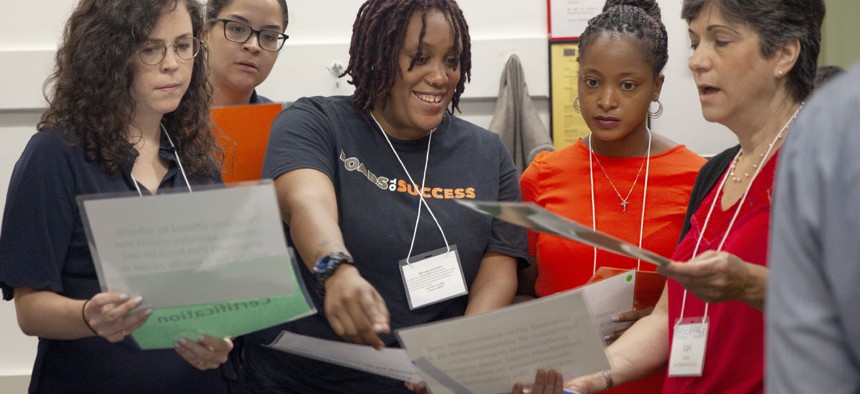Here's the latest of what's going on in youth development
About 380 people from after-school nonprofits and advocacy groups discussed recent trends.

PASE at PACE conference 2018 Pilar Albuerne Arámbula
The 2018 PASE at PACE Conference held Tuesday, July 24, at the university’s Lower Manhattan campus, brought together about 380 new and experienced individuals from after-school nonprofits and advocacy groups to discuss recent trends and rededicate themselves to their field.
“Individuals are able to connect with their peers, understand (the) shared values of youth development, and given the space to express their challenges and optimism around the work that we do,” said Alison Overseth, executive director of the Partnership for After School Education which is celebrating its 25th anniversary this year.
The conference, which is co-sponsored by Pace University's School of Education, has run for over two decades but was not held last year due to construction at the school.
“This year felt as if the after school and nonprofit community was recommitting to the importance and urgency, of the work we do every day - connecting caring adults and communities to young people to positively impact lives,” said Overseth.
The morning keynote speaker was Christopher Emdin, associate professor of science education in the Department of Math, Science and Technology at Teachers College, Columbia University. Emdin energized and inspired the crowd, gave them high praise for the difficult work they do and challenged them to consider: “How do you inspire young people, if you yourself are uninspired?”
Other workshops at the day-long event covered topics such as best practices for developing leadership skills in youth development professionals, how to maintain equity and inclusion in after school programs and discussed curriculum such as NBA Math Hoops.
“The variety of topics are intended to remain responsive to the needs of the after school community,” said Overseth.
A workshop titled Circles of Hope: A Community Learning Circle on Restorative Practices and Discipline, explored introducing the practice in a school setting. Restorative justice is an alternative to other more punitive modes of discipline that can sometimes lead youth to involvement with the criminal justice system in what is known as the school-to-prison pipeline.
Participants at the workshop were immediately asked to dive right in and actively participate in a restorative justice circle.
“We’re going to all bring our wisdom to the space, extract what we can from one another, share, build, dialogue to the best of our ability, and we’re going to use the modality to form a community among ourselves,” said Marinieves Alba, director of arts programs with the Children’s Aid, who led the 90-minute experimental workshop. The purpose of the physical circle was to establish equity and openness between participants.
“The real objective for us today is to experience this,” Alba said.
The discussion focused in on the distinction between discipline and punishment. According to Alba, discipline is rooted in wanting to teach and instruct, while punishment involves causing shame or pain. Punishment is avoided within the restorative justice framework. Attendees voiced concerns that in-school issues should be handled within a school setting and withholding access to after school programs should not be used as a punishment for students.
The workshop attendees left with an understanding that restorative practices were valuable, though they could be time-consuming in nature and require a lot of cooperation.
Alba concluded the workshop with advice that seemed to apply to everything the attendees learned during the full day of events: To move the cause forward, it’s up to the attendees to use these practices in their lives, she said.
“It’s going to be dynamic work that relies on our ability to adapt, listen, and connect, even in our most difficult moments,” she added.
The original version of this article incorrectly identified Children's Aid by its past name, Children's Aid Society.